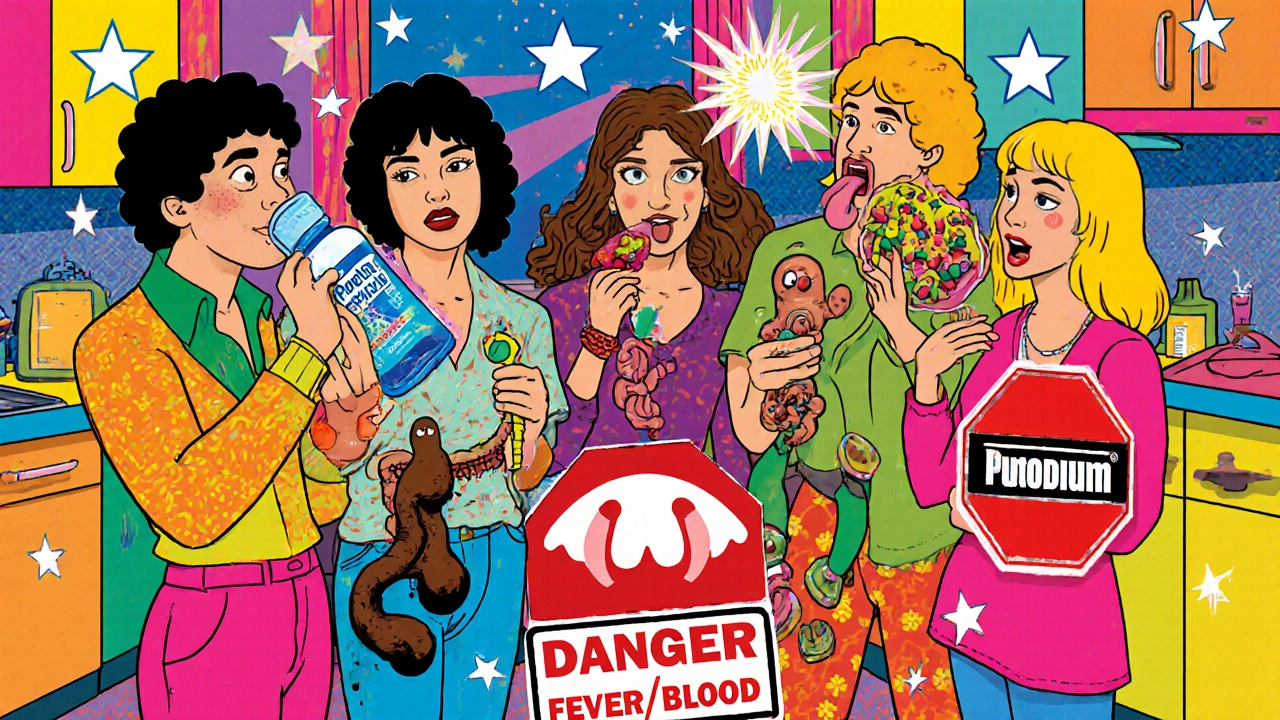Compare Imodium (Loperamide) with Alternatives for Diarrhea Relief
 Oct, 31 2025
Oct, 31 2025
Diarrhea Treatment Selector
Find the Right Treatment for Your Diarrhea
Select your symptoms and conditions below to get personalized recommendations. This tool is based on the latest medical guidance for diarrhea relief.
What Is Imodium (Loperamide) and How Does It Work?
Imodium is the brand name for loperamide, an over-the-counter medication that slows down gut movement to reduce diarrhea. It’s been used for decades and works by targeting opioid receptors in the intestines-not the brain-so it doesn’t cause a high or significant sedation. A typical dose is 2 mg after the first loose stool, then 1 mg after each subsequent loose stool, not exceeding 8 mg in 24 hours for adults.
It’s effective for acute diarrhea caused by food poisoning, viral infections, or travel-related issues. But it doesn’t treat the root cause-just the symptom. If your diarrhea lasts more than 48 hours, comes with fever, blood, or severe cramps, you should see a doctor. Using Imodium in those cases can trap harmful bacteria or viruses inside your system.
Why People Look for Alternatives to Imodium
Not everyone can use Imodium. Some people have side effects like constipation, dizziness, or stomach bloating. Others have medical conditions that make loperamide risky-like a history of liver disease, heart rhythm problems, or bowel obstruction. Pregnant women often avoid it unless advised by a doctor. And some just don’t feel it works well for them.
There’s also a growing awareness that diarrhea is sometimes the body’s way of flushing out toxins. Stopping it too soon might delay recovery. That’s why many look for gentler, natural, or prescription alternatives that support healing instead of just suppressing symptoms.
Bismuth Subsalicylate (Pepto-Bismol, Kaopectate)
Bismuth subsalicylate is the active ingredient in Pepto-Bismol and Kaopectate. Unlike loperamide, it doesn’t slow bowel movements. Instead, it coats the stomach lining, reduces inflammation, and kills certain bacteria like E. coli and H. pylori.
It’s often preferred for traveler’s diarrhea or when nausea and heartburn come with loose stools. The dose is 2 tablets or 30 mL every 30 minutes to 1 hour as needed, up to 8 doses in 24 hours. One downside: it turns your stool black and your tongue gray-harmless, but startling if you don’t know why.
It’s also not safe for children under 12, people allergic to aspirin, or those taking blood thinners. If you’re on NSAIDs or have kidney disease, talk to your doctor before using it.
Probiotics: A Natural Approach
Probiotics like Lactobacillus rhamnosus GG and Saccharomyces boulardii are live bacteria and yeasts that help restore gut balance. Unlike Imodium, they don’t stop diarrhea-they help your body recover from it faster.
Studies show that certain probiotics can reduce the duration of acute diarrhea by about 24 hours. S. boulardii, in particular, has been shown to cut the risk of antibiotic-associated diarrhea by up to 50%. You can find them in capsules, powders, or fermented foods like yogurt with live cultures.
They’re safe for most people, including kids and pregnant women. But they’re not fast-acting. You need to take them regularly for a few days to see results. Best used as a preventive measure during travel or after antibiotics, not as a quick fix.

Oral Rehydration Solutions (ORS)
Oral Rehydration Solutions (like Pedialyte, WHO-ORS, or store-brand electrolyte powders) aren’t anti-diarrheals-they’re essential support. Diarrhea doesn’t just lose you water; it strips away sodium, potassium, and other electrolytes. Without replacement, dehydration can become dangerous, especially in children and older adults.
ORS contains precise ratios of glucose and salts that help your intestines absorb fluids better than plain water. The CDC recommends ORS as the first-line treatment for diarrhea in all age groups. You take it in small sips throughout the day, even if you’re still having loose stools.
It won’t stop the diarrhea, but it prevents complications. Many doctors suggest combining ORS with probiotics or bismuth subsalicylate-not Imodium-for a safer, more complete recovery plan.
Prescription Options: Diphenoxylate/Atropine (Lomotil)
Lomotil combines diphenoxylate (a stronger opioid-like agent) with atropine (to discourage abuse). It’s prescription-only and typically used when OTC options fail or diarrhea is severe and persistent.
Diphenoxylate works similarly to loperamide but is more potent. It’s often used in hospitals for severe cases, like those linked to inflammatory bowel disease or after bowel surgery. But because it affects the central nervous system more than loperamide, it carries a higher risk of dependence and overdose.
It’s not recommended for children under 6, and it shouldn’t be used long-term. Doctors usually reserve it for cases where other treatments haven’t worked-and only after ruling out infections that need antibiotics.
When to Avoid All Anti-Diarrheals
Some types of diarrhea should never be treated with loperamide or similar drugs. If you have:
- High fever (over 101°F)
- Bloody or black stools
- Severe abdominal pain or swelling
- Recent antibiotic use (possible C. diff infection)
- Travel to areas with known waterborne pathogens
then stopping diarrhea could be dangerous. In these cases, your body needs to expel the pathogen. Using Imodium or Lomotil here is like putting a lid on a boiling pot-it increases the risk of complications like toxic megacolon or sepsis.
Instead, focus on hydration, rest, and medical evaluation. Antibiotics may be needed, but only if a bacterial cause is confirmed.

Choosing the Right Option for You
Here’s a simple guide to help you decide:
| Option | How It Works | Speed of Relief | Best For | Who Should Avoid |
|---|---|---|---|---|
| Imodium (Loperamide) | Slows intestinal movement | 1-2 hours | Mild, non-infectious diarrhea | People with fever, blood in stool, liver disease, heart issues |
| Pepto-Bismol (Bismuth) | Cools lining, kills bacteria | 30-60 minutes | Traveler’s diarrhea, nausea + diarrhea | Aspirin allergy, kids under 12, blood thinners |
| Probiotics | Restores good gut bacteria | 2-4 days | Prevention, antibiotic-related diarrhea | Severely immunocompromised (rare) |
| ORS (Electrolytes) | Replaces fluids and salts | Immediate (prevents worsening) | All ages, especially children and elderly | None-safe for everyone |
| Lomotil (Prescription) | Stronger gut slowdown | 1-2 hours | Severe, persistent diarrhea under medical care | Children under 6, history of substance abuse |
For most people with mild, short-term diarrhea, a combination of ORS and probiotics is the safest, most effective approach. Use bismuth subsalicylate if you have nausea or suspect food poisoning. Save Imodium for occasional use when you need quick relief and no red flags are present. Lomotil? Only if a doctor says so.
What to Do If Nothing Works
If your diarrhea lasts longer than 3 days, gets worse, or you start feeling weak, dizzy, or have dry mouth and little urine-you’re likely dehydrated. That’s a medical emergency. Don’t keep trying stronger anti-diarrheals. Go to a clinic or urgent care. Blood tests and stool cultures can identify infections like giardia, salmonella, or C. diff that need specific treatments.
Chronic diarrhea (lasting weeks) is a different problem altogether. It could be linked to IBS, celiac disease, or inflammatory bowel disease. Those need long-term management, not quick fixes.
Is Imodium safe for children?
Imodium is not recommended for children under 2 years old. For kids 2 to 12, it should only be used under a doctor’s guidance. The risk of serious side effects, including slowed breathing and heart rhythm problems, is higher in young children. For kids, focus on oral rehydration and probiotics instead.
Can I take Imodium with antibiotics?
It’s generally not advised. Antibiotics can cause diarrhea by disrupting gut bacteria, and using Imodium might trap harmful organisms in your intestines. Instead, use probiotics during and after antibiotics to reduce this risk. Always check with your doctor before combining medications.
Is Pepto-Bismol better than Imodium for traveler’s diarrhea?
For traveler’s diarrhea, Pepto-Bismol is often preferred because it doesn’t just slow things down-it kills bacteria like E. coli that commonly cause the issue. Imodium only masks symptoms. Many travelers carry both: Pepto-Bismol for immediate relief and ORS to stay hydrated.
Do probiotics really help with diarrhea?
Yes, but not all probiotics are the same. Strains like Lactobacillus rhamnosus GG and Saccharomyces boulardii have strong evidence backing them for reducing diarrhea duration by about a day. They’re most effective when taken early and consistently. Don’t expect instant results-they’re a healing tool, not a quick fix.
Can I use Imodium every day for IBS?
Some people with IBS-D (diarrhea-predominant) use loperamide occasionally, but daily use isn’t recommended. Long-term use can lead to constipation, dependence, or even heart rhythm issues at high doses. Work with a doctor to find a balanced plan-diet changes, stress management, and sometimes prescription meds like rifaximin are safer long-term options.
Final Thoughts: Don’t Just Stop It-Heal It
Diarrhea isn’t an enemy to be silenced. It’s a signal. Your body is trying to get rid of something. The goal isn’t to make it disappear as fast as possible-it’s to support your body while it does its job. That means staying hydrated, giving your gut time to recover, and choosing treatments that help rather than hinder.
Imodium has its place, but it’s not the only tool-and not always the best one. For most cases, a mix of hydration, probiotics, and gentle symptom relief works better and safer. Know your options. Listen to your body. And when in doubt, talk to a healthcare provider.
Kelsey Worth
November 2, 2025 AT 05:16also why is everyone acting like diarrhea is the enemy? it's just your guts screaming 'GET OUT OF HERE' and you're putting a bandaid on it.
shelly roche
November 3, 2025 AT 03:13And yes, the black stool thing with Pepto? First time it happened to me I called 911. Turned out I just needed a laugh and a glass of water. Probiotics aren't magic, but they're the closest thing we have to a gentle reset button for the gut.
Nirmal Jaysval
November 3, 2025 AT 17:45also why u use so many words for simple thing? just drink water and chill. no need for tables and science jargon.
Emily Rose
November 3, 2025 AT 22:23For a single mom working two jobs whose kid gets traveler’s diarrhea? ORS and probiotics aren't 'soft,' they're survival tools. And yes, Imodium has risks-but so does dehydration in a 3-year-old. We need options, not judgment.
This post saved my life last year when I was stuck in a hotel with a fever and no doctor nearby. Knowledge is power, not weakness.
Benedict Dy
November 4, 2025 AT 20:59Probiotics show modest effect sizes in meta-analyses, but their clinical utility remains questionable for acute cases. ORS is the only intervention with robust, reproducible mortality reduction. Everything else is symptom management with variable risk profiles.
Loperamide misuse is a documented public health concern, particularly with high-dose abuse for opioid-like effects. The FDA warnings are not hyperbolic.
That said, the comparative table is well-constructed and the contraindications are appropriately highlighted.
Emily Nesbit
November 6, 2025 AT 02:34And no, you don't 'save' Imodium for 'occasional use.' That's how people end up in the ER with ileus and QT prolongation.
Probiotics? Fine. ORS? Mandatory. Pepto? Acceptable if you don't mind looking like you swallowed a charcoal briquette. But if you're reaching for any of these daily, you're not treating diarrhea-you're ignoring the real problem.
Go see a doctor. Seriously.